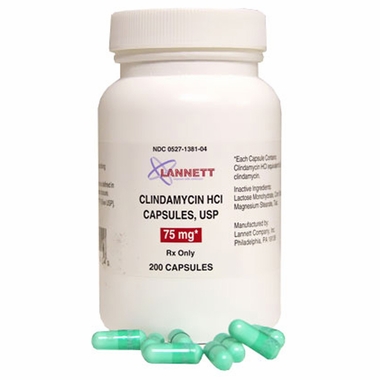SAVE 15% OFF 15% OFF Use Code EPX15 *

Clindamycin for Dogs & Cats - 75mg (200 caps) (Manufacturer may vary) - [Bacterial Infections Treatment]
- Description
- Ingredients
- Directions
- FAQ
- Reviews
Description
Clindamycin is an antibiotic used to treat soft tissue, dental, and bone infections caused by susceptible strains of bacteria. It is used to treat serious infections. Clindamycin may also be used for purposes other than those listed here. Clindamycin is sold per capsule or per tablet and requires a prescription from your veterinarian.
Key Benefits
- Effectively treats a wide variety of bacterial infections
- Treats soft tissue infections
- Treats bone and dental infections
- Sold per capsule or per tablet
How it works
Clindamycin fights infections caused by susceptible bacteria. Clindamycin works by stopping the growth of bacteria.
Indications:
Clindamycin capsules for dogs and cats are a broad-spectrum antibiotic. Clindamycin for dogs treats skin, bone and dental infections in dogs. Treats abscesses and wounds in cats.
Ingredients
| Clindamycin 75 mg Tablets | |
|---|---|
| Active Ingredient | Amount |
| Clindamycin Hydrochloride | 75 mg |
| Clindamycin 150 mg Tablets | |
| Active Ingredient | Amount |
| Clindamycin Hydrochloride | 150 mg |
| Clindamycin 300 mg Tablets | |
| Active Ingredient | Amount |
| Clindamycin Hydrochloride | 300 mg |
Directions
- Clindamycin is a prescription antibiotic used in the treatment of serious infections such as soft tissue infections, dental infections, and bone infections.
- Give this medication the entire length of time prescribed by your veterinarian. Symptoms may get better before the infection is fully treated.
Tip: Antibiotics can cause diarrhea. If the diarrhea is watery or has blood in it, call your veterinarian. Do not use any medication to stop the diarrhea unless your veterinarian has told you to do so.
| Clindamycin Dosage for Cats | |
|---|---|
| Weight | Dosage |
| All weights | The usual dose for cats is 5-15 mg/lb once every 24 hours |
| Clindamycin Dosage for Cats | |
| Weight | Dosage |
| All weights | The usual dose for dogs is 2.5-15 mg/lb every 12 hours for a maximum of 28 days |
Cautions:
Antibiotics can cause diarrhea. If the diarrhea is watery or has blood in it, call your veterinarian. Do not use any medication to stop the diarrhea unless instructed by your veterinarian.
Side effects:
Side effects may include stomach upset, vomiting and diarrhea. If your pet develops severe, prolonged or bloody diarrhea, contact your veterinarian immediately. Other side effects may occur. If you notice anything unusual, contact your veterinarian.
Precautions:
Clindamycin hydrochloride capsules are contraindicated in individuals with a history of hypersensitivity to preparations containing clindamycin or lincomycin.
Keep away from children.
If diarrhea develops consult your veterinarian.
Storage:
Clindamycin should be stored at room temperature away from moisture and heat.
Warnings:
Do not use in patients allergic to clindamycin or drugs similar to it (ex. Lincomycin or azithromycin).
Use with caution in patients with liver or kidney damage.
Overdoses can be very dangerous. Keep out of reach of children and animals.
Always follow the dosage instructions provided by your veterinarian. If you have difficulty giving the medication, contact your veterinarian.
If you miss a dose, give it as soon as you remember. If it is almost time for the next dose, skip the one you missed and go back to the regular schedule. Do not give two doses at once.
This medication should only be given to the pet for whom it was prescribed.


